It’s been another busy week for pollsters LucidTalk – they’ve just released results of their latest survey. Should we hold a border poll? If a referendum was held tomorrow, how would we vote – and why? You can catch plenty of analysis on Northern Slant in the coming days. Until then, here’s 10 things we’ve learned from previous LucidTalk opinion polls this year.
1. In June, six months after the DUP-Sinn Féin Executive collapsed, a decisive majority of people here still wanted to see power-sharing.
James McMordie shared his views in the article: Does LucidTalk poll signal a tailwind for devolution?
How did respondents feel come September’s poll? We’ll find out below.
2. 20% of respondents who described themselves as UUP supporters and voters think the party should look to the DUP to forge a single unionist party (June poll).
This author published the article: When the UUP runs out of road, where will its faithful go?

Dated June 2017: “We note you said you voted/supported [insert party] in the recent elections (and/or support this party now). Taking into account the poor UUP election results, the recent resignation of former UUP chairman David Campbell, what do you think is the best plan for the UUP (and minor unionist parties) in the future?” 2,080 responses (weighted); displaying results by voters of different unionist parties. ‘Other unionist voters’ are supporters of the TUV, PUP, UKIP and NI Conservatives.
3. 87% of Sinn Féin voters or supporters said they agreed with Sinn Féin’s policy of abstaining from taking their seats at Westminster. Only 5% told LucidTalk they disagreed with abstentionism (June poll).
When these same respondents were asked how they would feel if the Sinn Féin leadership judged that it strategically suited the party’s republican agenda to take their seats at Westminster, over 50% said they would either not like this policy change, or would be totally against it.
This writer posted the article: LucidTalk poll shows Sinn Féin abstentionism is here to stay.

Dated June 2017: “We note you said you voted/supported Sinn Féin in the recent elections (and/or support them now). Do you agree with the Sinn Féin policy of abstaining from taking their seats in Westminster?” 2,080 responses (weighted); displaying results for Sinn Féin voters only.

Dated June 2017: “If the Sinn Féin leadership judged that it strategically suited Sinn Féin’s overall republican objectives to take their seats at Westminster, would you agree with this?” 2,080 responses (weighted); displaying results for Sinn Féin voters only.
4. In June, one year after the Brexit referendum, unionist voters ranked a ‘hard’ Brexit as their most preferred outcome in negotiations.
Support for a ‘soft’ Brexit wasn’t far behind (meaning the whole of the UK would leave the EU, but would remain in the Single Market and Customs Union).
The least preferred option for unionists was for Northern Ireland to possess ‘special status’, (meaning the rest of the UK could leave the Single Market and Customs Union, but Northern Ireland would still remain in each).
5. Among nationalist voters, in June, the ‘special status’ option scored the highest ranking. A ‘soft’ Brexit was the next preferred option. A ‘hard’ Brexit scored very low with respondents.
More analysis can be found with Jamie Pow’s article: A ‘green, white and orange’ Brexit? Results from the latest LucidTalk poll.

Dated June 2017: “The UK and the EU have started negotiations on Brexit. Please rank the following 3 possible outcomes for Northern Ireland (NI) from best to worst, in terms of which outcome you think is the best result for NI.” 2,080 responses (weighted); displaying the ordered preferences of unionist, nationalist and other respondents based on the sum of weighted ranks for each group.
6. 61% of respondents said, ‘Yes – Same-Sex marriage should be legal in Northern Ireland’.
32% answered, ‘No – The current NI Law should remain as it is’. A further 6% did not know or had no opinion on the topic (September poll).
You can catch Polona Rogina’s analysis here: LucidTalk poll: Overall support for same-sex marriage in Northern Ireland.
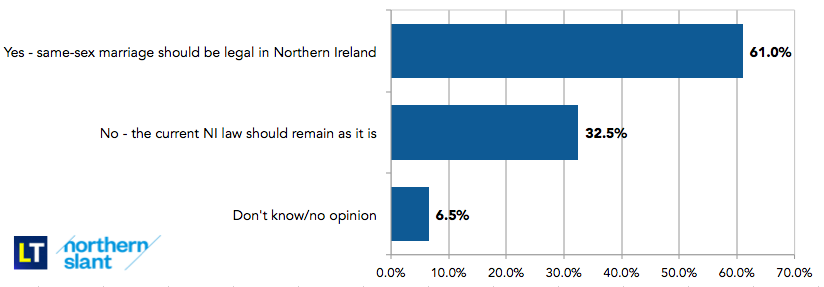
Dated September 2017: “Same-sex marriage is now legal in Great Britain and the Republic of Ireland, but not in Northern Ireland. If a referendum on same-sex marriage was to be held in Northern Ireland tomorrow, which way would you vote?” 2,020 responses (weighted).
7. On the question of legalising same-sex marriage, in September, of the 47.2% of respondents who said they vote for a unionist party 38% said they would vote in favour of same-sex marriage. 56% said they preferred if the current law stayed the same. Among nationalist/republican voters (42%), an overwhelming 91% said they would support same-sex marriage in a referendum.
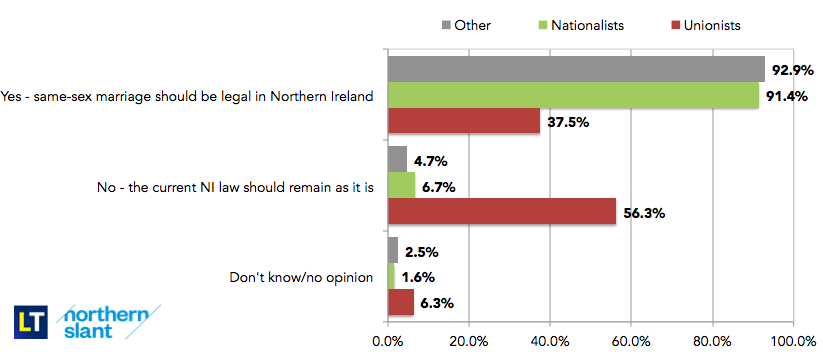
Dated September 2017: “Same-sex marriage is now legal in Great Britain and the Republic of Ireland, but not in Northern Ireland. If a referendum on same-sex marriage was to be held in Northern Ireland tomorrow, which way would you vote?” 2,020 responses (weighted); displaying results by voters of unionist, nationalist and other parties.
8. The vast majority of DUP voters (35% of September’s overall sample) supported the party’s stance against an Irish language act. However, when asked if they’d mind if the party decided to compromise on its initial position DUP voters are strikingly split down the middle.
Half said they would not support the party if it decided to compromise. 45% would accept a compromise on an Irish language act, while 5% were unsure.
Check out Jamie Pow’s analysis here: What do people think about an Irish Language Act? Results from LucidTalk’s latest poll.
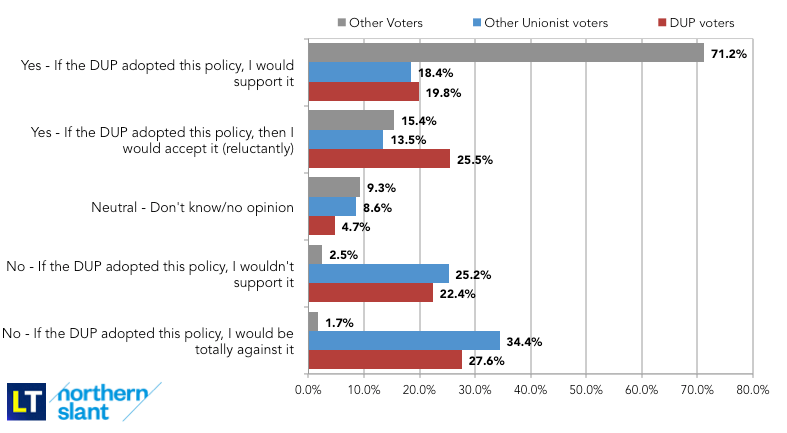
Dated September 2017: “If the DUP judged that it suited DUP objectives to agree to an Irish Language Act, say as an overall agreement with Sinn Féin, as a … voter, would you agree with this?” 2,080 responses (weighted), displaying results for DUP voters, other unionist voters, and voters of other parties (Alliance/Green/independent).
9. By September’s LucidTalk poll, 53% of voters in Northern Ireland still saw devolved government as the best way forward.
This was down from 60% in June but, given all that has transpired since then, it is positive to note that the majority have faith in devolution.
Analysis from James McMordie can be found here: Do people want Stormont restored? Results from the latest LucidTalk poll.
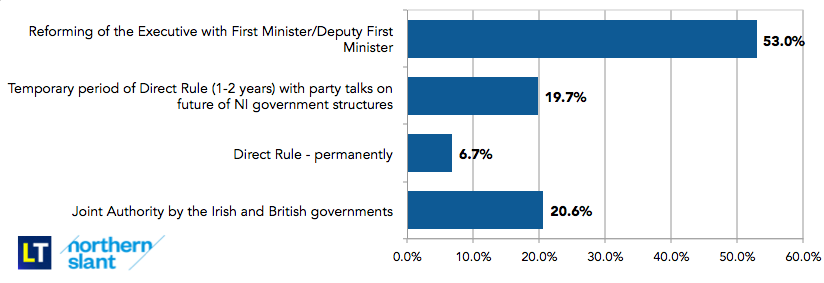
Dated September 2017: “Discussions are currently taking place about re-establishing the NI government institutions. Which outcome would you say is the best result for the government of Northern Ireland?” 2,080 responses (weighted)
10. In the absence of Stormont, in September we found that the remuneration of MLAs has gone down less favourably with unionists than with nationalists – and even less favourably with ‘centrist’ voters.
Analysis from Heather Wilson can be found here: MLA Salaries: No work and all pay.
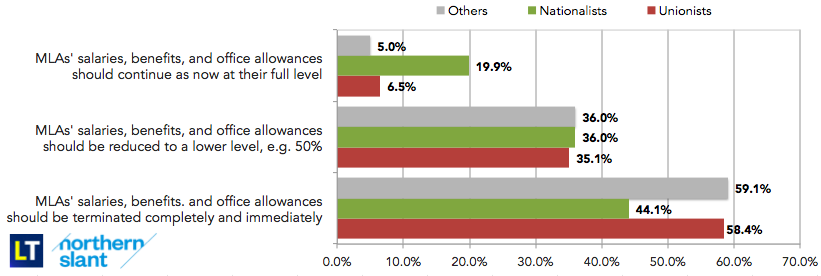
Dated September 2017: “If the current NI political discussions fail and the UK government implements ‘Direct Rule’, what is your view as to what should happen regarding the remuneration of the members of the NI Assembly (MLAs)?” 2,080 responses (weighted), displaying results for unionist, nationalist and ‘other’ party supporters
Methodology, and more on LucidTalk
Polling was carried out by Belfast based polling and market research company LucidTalk. The project in June was carried out online for a period of 60 Hours from 11am 21st June to 11pm 23rd June 2017 (60 Hours). The project in September was carried out online for a period of 80 Hours from 1pm 8th September 2017 to 9pm 11th September 2017 (80 Hours). The projects targeted the established Northern Ireland (NI) LucidTalk online Opinion Panel (8,827 members in June; 10,103 members in September) which is balanced by gender, age-group, area of residence, and community background, in order to be demographically representative of Northern Ireland.
2,883 full responses were received in June, 3,104 in September. A data auditing process was carried out on each sample to ensure that all completed poll-surveys were genuine ‘one-person, one-vote’ responses, and also to collate a robust and accurate balanced NI representative sample. This resulted in 2,080 responses being considered in terms of the final results for each poll – the results presented in this article.
All data results have been weighted by gender and community background to reflect the demographic composition of Northern Ireland resulting in 2,080 responses being considered in terms of the final results. All data results produced are accurate to a margin of error of +/-3.0%, at 95% confidence.
LucidTalk is a member of all recognised professional Polling and Market Research organisations, including the UK Market Research Society (UK-MRS), the British Polling Council (BPC), and ESOMAR (European Society of Market Research organisations).
For more information, visit www.lucidtalk.co.uk and follow @LucidTalk on Twitter.
Also published on Medium.
